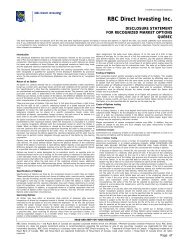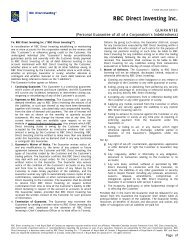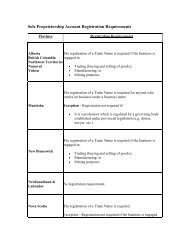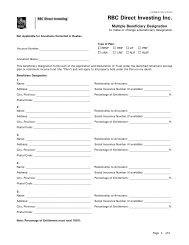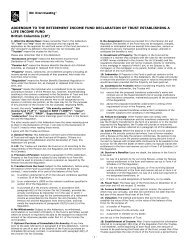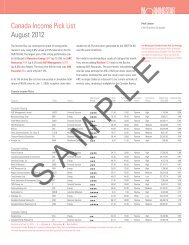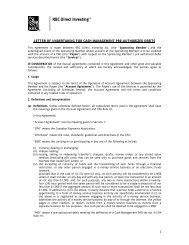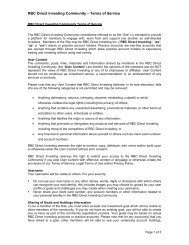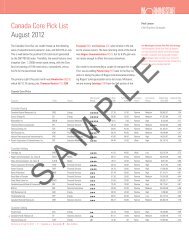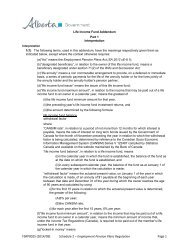View Sample PDF - RBC Direct Investing
View Sample PDF - RBC Direct Investing
View Sample PDF - RBC Direct Investing
Create successful ePaper yourself
Turn your PDF publications into a flip-book with our unique Google optimized e-Paper software.
Global Fixed income markets • Soo Boo Cheah, CFA • Suzanne Gaynor<br />
The short-term fixes rely heavily on<br />
the ECB and member assistance that<br />
comes with high political hurdles.<br />
The long-term solution is to gain<br />
economic competitiveness via internal<br />
devaluation within the union, and this<br />
painful adjustment involves much<br />
needed structural reforms that provoke<br />
social unrest. If EMU was founded<br />
purely for economic reasons, surely it<br />
would not have been conceived, but<br />
EMU was mostly driven by a desire<br />
on the part of Europeans to avoid<br />
the military conflicts of the past. This<br />
very fundamental founding principle<br />
is currently under serious threat.<br />
Eurozone leaders need to move to the<br />
next level with drastic and difficult<br />
measures to strengthen the existence<br />
of the EMU. Anything other than this<br />
will prove that bond investors are right<br />
to feel apprehensive.<br />
Europe’s crisis so far has not been<br />
accompanied by massive capital flight<br />
from the Eurozone. Exhibit 2 shows<br />
foreigners have been liquidating<br />
European assets, but the scale is not<br />
matched by the larger liquidation<br />
by European investors of foreign<br />
assets that are being repatriated and<br />
sheltered in bunds. However, there<br />
is serious capital flight taking place<br />
within the Eurozone as evident in large<br />
imbalances in TARGET2, the system<br />
that settles cross-border flows among<br />
national central banks in the Eurozone.<br />
Prior to the crisis, trade-deficit outflows<br />
were usually counterbalanced by the<br />
capital inflows of surplus countries.<br />
With the onset of the current crisis,<br />
the weaker nations have incurred<br />
large liabilities (capital flight) and<br />
left the German national bank with<br />
large surplus claims (€650 billion as<br />
of April 2012, equivalent to 25% of<br />
Exhibit 2.<br />
12-Month Sum, Billions<br />
1,000<br />
800<br />
600<br />
400<br />
200<br />
0<br />
-200<br />
No Capital Flight Out of the Eurozone<br />
Eurozone Balance of Payments Portfolio Flows<br />
European Purchases of Foreign Assets<br />
Foreign Purchases of European Assets<br />
-400<br />
2000 2001 2002 2003 2004 2005 2006 2007 2008 2009 2010 2011 2012<br />
300<br />
200<br />
100<br />
0<br />
-100<br />
-200<br />
-300<br />
-400<br />
-500<br />
Europeans have been<br />
bringing money home!<br />
2000 2001 2002 2003 2004 2005 2006 2007 2008 2009 2010 2011 2012<br />
Source: Bloomberg, <strong>RBC</strong> GAM<br />
Germany’s annual GDP). Eurozone<br />
residents still believe in the cohesion<br />
of the Eurozone as a whole, which<br />
is illustrated by continued positive<br />
net inflows. However, doubts remain<br />
about the ability of the weaker nations<br />
to weather the current crisis. From a<br />
bond-market standpoint, large capital<br />
inflows into the German banking<br />
system will be recycled into bunds.<br />
The rising demand for bunds from the<br />
Eurozone banking system and private<br />
investors is taking place while the<br />
supply of bunds dwindles. The fear of<br />
contagion if Greece exits the Eurozone<br />
is causing extended turmoil in financial<br />
markets and sending bund yields lower<br />
by the day. Markets are scrutinizing<br />
the Greek political campaign leading<br />
up to the June 17 election to assess<br />
the possibility of damage from<br />
contagion in the global financial<br />
system. Investors are also monitoring<br />
the political will of the member states<br />
to hold the Eurozone together in the<br />
face of antagonistic domestic political<br />
agendas.<br />
SAMPLE<br />
In addition to risk aversion, centralbank<br />
intervention has been fueling<br />
the rally in government bonds. All<br />
major central banks have intervened<br />
in the past three months, either by<br />
expanding their balance sheets or<br />
offering generous liquidity. However,<br />
quantitative easing by the Bank of<br />
England has now ended, and the U.S.<br />
Federal Reserve Board’s “Operation<br />
The global investment outlook <strong>RBC</strong> INVESTMENT Strategy coMMITTEE Summer 2012 I 35



